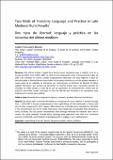Two kinds of freedom : language and practice in late medieval rural revolts
Abstract
This article looks at the role of freedom as a motivation for rural rebellion in northern Europe from c. 1200-1450. It focuses comparatively on the English Rising of 1381 and revolts in France with some further comparison to other regions. While discourses of freedom were important in 1381 both in the chronicle texts and to the rebels themselves, most rebels did not articulate their demands in terms of liberty. The last section demonstrates that although demands for freedom were rare in revolts, the social networks through which uprisings were organized show that rural communal practices constituted a kind freedom, enabling peasants to engage in socio-political action.
Citation
Firnhaber-Baker , J 2020 , ' Two kinds of freedom : language and practice in late medieval rural revolts ' , Edad Media. Revista de historia , vol. 21 , pp. 113-152 . https://doi.org/10.24197/em.21.2020.113-152
Publication
Edad Media. Revista de historia
Status
Peer reviewed
ISSN
2530-6448Type
Journal article
Description
This article is a result of the research project funded by the Spanish Government (MINECO) “Los nombres de la libertad : Comunidad política autonomía a fines de la de la Edad Media” (HAR 2017-30035 -P) and the research project “The Jacquerie and Late Medieval Revolts” funded by the British Arts and Humanities Research Council (AH/K006843/1)Collections
Items in the St Andrews Research Repository are protected by copyright, with all rights reserved, unless otherwise indicated.

